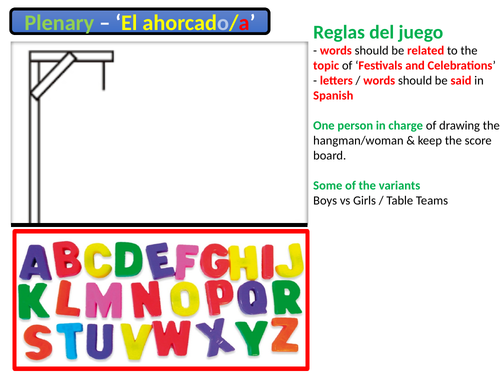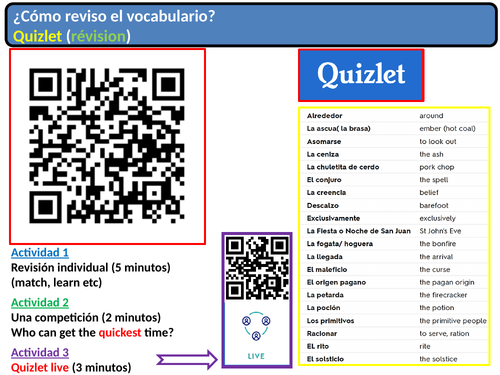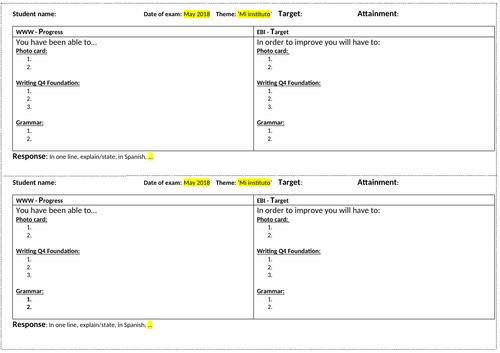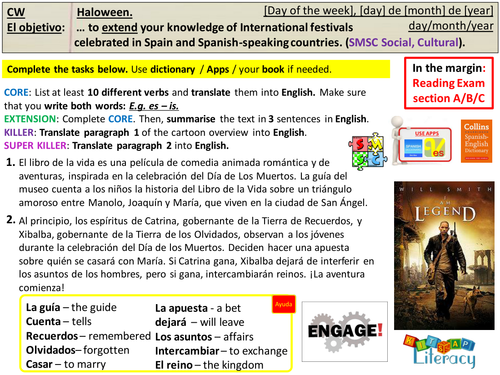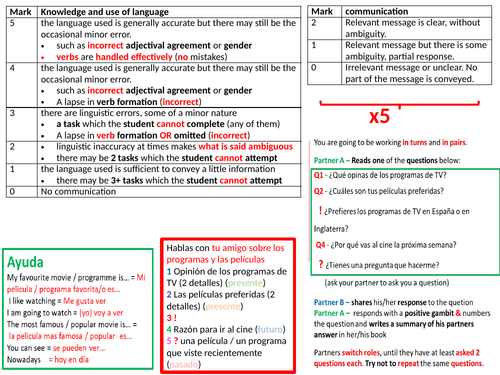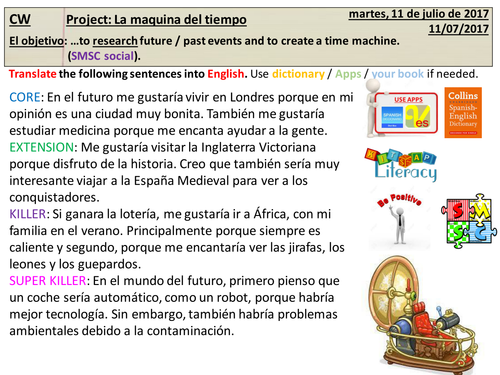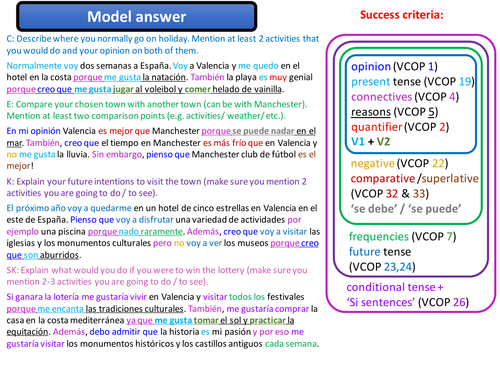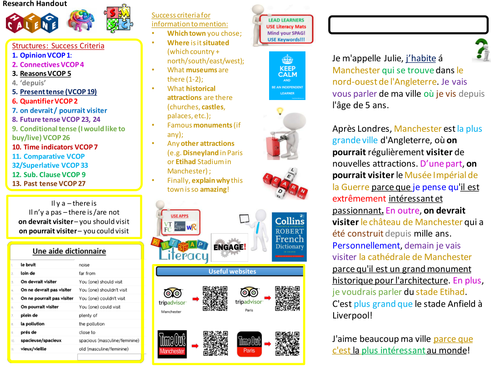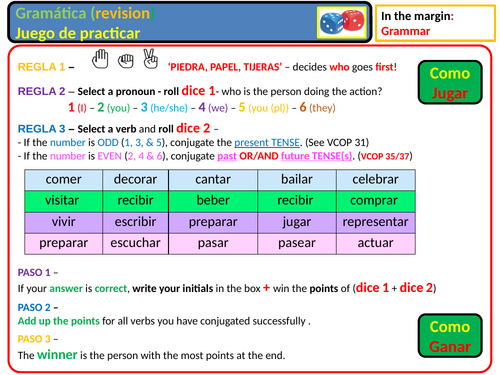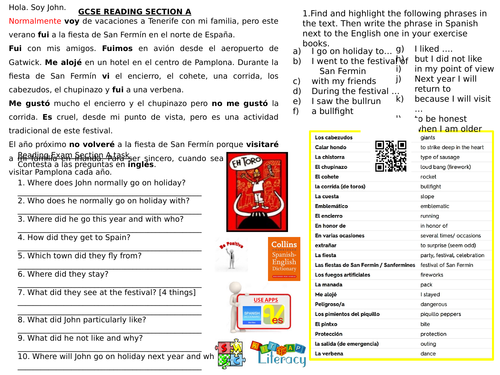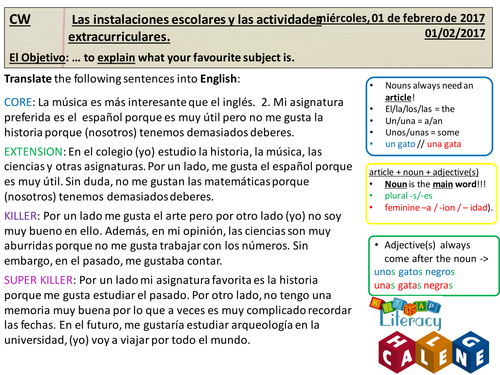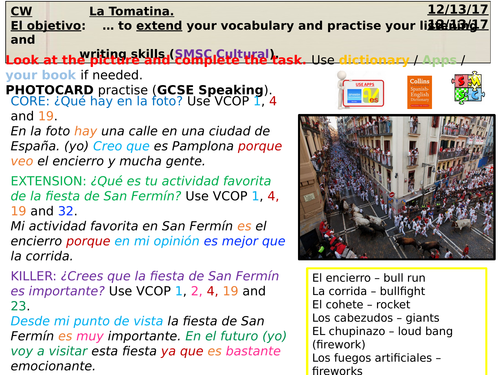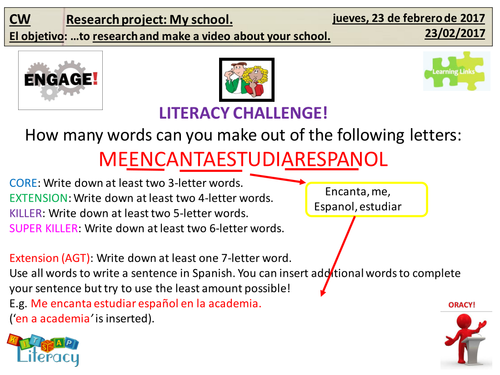
121Uploads
35k+Views
5k+Downloads
Languages

GCSE Spanish - Vocabulary GAME - el ahorcado - Hangman slide
One of the most popular word games ever… And students love it as a reward for a good work during the lesson!

GCSE Spanish - Revision GAME - Quizlet Quizlet live Template Slide
This is template slide for a PowerPoint Presentation based on Quizlet revision website. (https://quizlet.com)
I usually use it either to revise known words or to learn new ones prior to completing a set of reading / writing / listening / speaking exercises on a set topic.

AQA GCSE Spanish / French / KS4 / KS3 Assessment e-Feedback - blank template
Assessment e-Feedback - blank template if anyone finds it useful. I used for Spanish GCSE classes but it can be adapted for French or KS3. Have a look and let me know what you think!

Spanish Trailer of Secret Life of Pets
Hi everyone! I realised that some things disappear from Youtube, including trailers which are very useful to engage students.
I have therefore downloaded this trailer to use for educational purposes only.

KS3 KS4 Spanish - SKILLS - How to use a dictionary effectively / Aste Nagusia
This is the resource that I have prepared for both GCSE and KS3 classes. It can be used as a template as the only thing you would change is the text and the words. I believe the full set of slides needs to be used several times until a group of students remember the sequence of actions. The only thing left is to continue revisiting to gain confidence in using the dictionary!
The text that I chose to introduce this task is based upon short cultural texts on the topics of a Basque festival, Aste Nagusia, and Las Hogueras de San Juan. Students look through the first text and analyse the explanation of different things one can find next to the Spanish word in a dictionary. Then they compete (a game!=team challenge) to translate the words.
Then they work in teams to figure out how to use the bi-lingual dictionary effectively - they analyse simple words used in classroom language and try to find their meaning in Spanish at the same time not forgetting to pay attention to gender of the nouns and adjectival agreement (extension - they think of more examples of words they could use). For KS4 students you might add another level of difficulty - include verbs in English in different tenses and let them decide how to correctly translate these verbs in Spanish.
Finally they have a look at the second text and try translating it themselves into English (or given words / very simple text if KS3)
The most important thing in my point of view is to remember that translating is an art not a precise science!
NOTE: I used a dictionary cut outs from the internet which is most likely an extract from Collins Eng-Sp and Sp-Eng dictionary.

KS4 Spanish Halloween El Dia de los Muertos (AQA GCSE)
This is a lesson which I prepared for my KS4 Spanish groups for the end of the term. It includes one of my favourite starters - students have to analyse the overview of the cartoon - The Book of Life - and choose a task according to their level. You would then check the answers and would move on to explaining the lesson outcomes. Then they would have some fun with a tongue twister, working on their pronunciation of ‘Br’ sound (one of their favourite thing to do every lesson - easy to find and to tick SMSC, engagement, phonics and oracy points).Then I have included a mind map mini-plenary for them to revise the festivities/celebrations vocabulary. It is then followed by the new vocabulary introduction with a quizlet and quizlet live games. A short Rally coach activity is included for them to consolidate the vocabulary and to practice translating topic-related sentences. I have then arranged for a listening / reading activity using one of the youtube videos of the SpanishPod101 about Halloween. The lady speaks fast but there are Spanish and English subtitles at the bottom to assist students with understanding the video. They would answer the listening questions as they listen to /watch the video. The next task is Reading (Section B) - they need to insert the correct words in the text about the Day of the Dead followed by the AQA skill-based self-assessment. Finally, the ‘words’ snake’ plenary that students totally love - they have to work in groups remembering topi-specific vocabulary. Enjoy!

Role-play: opinions on TV / movies - Spanish - AQA KS3/KS4 GCSE (Role-play)
This is a lesson on TV shows for an early GCSE Spanish class which can be used with a higher year 8 students.
The lesson starter is a recap on some simple concepts (articles / gender / adjectival agreement/ spelling) to wake the students up followed by phonics practice (resiting tongue twister!). Then I included a mini-test to recap / check whether students remember topic-related vocabulary.
Then they get to revise topic words via online quizlet activity. Students are to choose what quizlet task they want to do based on their level therefore this engaging task is differentiated. Then I have included a game - Roll-A-Word - Students roll a dice to complete different tasks related to the new and / or familiar words (both learning and revising). They count the value of the completed dices to make the task more competitive. Then they revise question words and how to form different types of questions in Spanish. They then jot their thoughts on a Role Play task in pairs (using grammar help - note: we use VCOP mat so if you have one you will need to change the numbers of the grammar points, if not you need to delete few bits, the examples of structures are provided anyway) and complete in in writing individually . Then their ‘Time Pair Share’ the Role Play and self/peer -assess their work by way of analising the success criteria (you might want to show it prior to the task for the novices).
Please let me know if there are any problems / ideas! Enjoy!

Research project (Motivational triggers) for KS3 Spanish - La maquina del tiempo (AQA new spec)
This is a research project lesson (or two lessons really) that I created for my year 8 Spanish students. The writing example can be easily adapted if more structures are to be added. The idea is to promote independent learning via research. Students have to research information about past or future events that they would like to visit if they were to have a time machine and create a poster or a set of notes. Students decide on the task and start researching relevant information using their iPads/ Chromebooks. At the same time they create a cardboard / paper time machine and produce a piece of writing as per model answer. In the end they stick their written notes / writing around the time machine (or attach it to their poster with researched information). The whole process takes about 2 lessons and is perfect for the end of the topic as you can incorporate all of the structures / vocabulary learned during the term! Note: the writing example is oriented on the working knowledge of conditional tense and related popular expressions. Please let me know if you have any other ideas on how this project can be implemented.If you still have some time left you can enjoy few games I have inserted to simply have fun during the (possibly) last lesson of the year.

Research project (Motivational triggers) for KS3 Spanish - Buen Viaje (Holidays) (AQA new spec)
This is a research project lesson (or two lessons really) that I created for my year 7 Spanish students. The writing example can be easily adapted if more structures are to be added. The idea is to promote independent learning via research. Students have to research information about the place that they would like to visit (any place in world really but I encouraged to visit Spain). Students decide on the task and start researching relevant information about the chosen location using their iPads/ Chromebooks. At the same time they create a poster or a travel brochure with pop-up images (!!!) about the chosen location. During the second lesson they distribute the writing task bullet points in-between the members of the group and complete a piece of writing as per success criteria and model answer. In the end they stick their written notes (or attach them) to their poster /travel brochure. The whole process takes about 2 lessons and is perfect for the end of the topic as you can incorporate all of the structures / vocabulary learned during the term! Note: the writing example is oriented on the revision of tenses studied this year, holidays, weather and location vocabulary. Please let me know if you have any other ideas on how this project can be implemented. If you still have some time left you can enjoy few games I have inserted to simply have fun during the (possibly) last lesson of the year.

Town research project for KS3/KS4 Spanish - Mi ciudad favorita
This is a research project lesson (or two lessons really) that I created for my year 8 Spanish students. It can also be used for year 9 as the model answer has quite a list of grammar / some more can be added. The idea is to promote independent learning via research. There are two choices: a documentary about your favourite town in England (in my case it is Manchester) or an interview with a football player about his town in Spain ( I chose Madrid). Students decide on the task, the roles and start researching relevant information using their iPads (one of the students needs to summarise the information that others found). They then have to prepare a script in Spanish and to make a video using iMovie or any other video application. If there is little time I would suggest them to present it and I would film it. The whole process takes about 2 lessons and is perfect for the end of the topic as you can incorporate all of the structures / vocabulary learned during the term!

Town research project for KS3/KS4 French - Ma ville préférée
This is a research project lesson (or two lessons really) that I created for my year 8 French students. It can also be used for year 9 as the model answer has quite a list of grammar / some more can be added. The idea is to promote independent learning via research. There are two choices: a documentary about your favourite town in England (in my case it is Manchester) or an interview with a football player about his town in France( I chose Paris). Students decide on the task, the roles and start researching relevant information using their iPads (one of the students needs to summarise the information that others found). They then have to prepare a script in French and to make a video using iMovie or any other video application. If there is little time I would suggest them to present it and I would film it. The whole process takes about 2 lessons and is perfect for the end of the topic as you can incorporate all of the structures / vocabulary learned during the term!

Spanish Verb conjugation games (AQA GCSE/KS3)
This is a collection of verb conjugation games that I decided to share. I would use them for pretty much all age groups, both KS3 and KS4, GCSE both tiers. They can be easily amended to suit the grammar topics that you wish to reinforce / revise / introduce. The templates can also be easily reused for French.
See enclosed:
Snakes and ladders slide (you can amend the squares and it is short enough to serve as a 5-10 minutes activity;
The dice game to revise verbs conjugations (differentiated). I included a slide with rules of the game, a template to create your own and an origami instructions to make it more hands on.
Dice conjugation (differentiated) - I would mostly suggest it for KS4 students as it is easier to differentiate. Students have a board with verbs and they need to roll dices to ascertain the personal pronoun that they apply to the infinitive on the board. My students totally loved it!
Let me know how it goes!

Spanish Festivals: San Fermin - Spanish KS4 AQA Reading A
This is the lesson that I have prepared for my y9/y10 in relation to the topic of Spanish culture (Festivals & Celebrations). The lesson starts with the starter about food (it was previous topic and I always try to link things together) and following review of lesson outcomes we move onto to trying to recite a tongue twister (plus a cultural SMSC tip!). Students will then recap on regular verbs conjugation in present tense and learn new / revise already known vocabulary on the topic of San Fermin celebration using Quizlet and Quizlet live tools. I have then included a video (see link) of Rosa from SpanishPod101 (see their channel in youtube) describing the celebration of San Fermin. Even though the video is in Spanish and Rosa speaks really quickly, there are subtitles in English so that all students have a chance to listen to a native speaker and at the same time understand what the video is about (note: I personally find the Spanishpod101 videos amazing as they address quite a few cultural / grammar / pronunciation and other aspects so I would recommend letting your students know that a lot of resources are available for free. Consequently, students answer quiz questions about the video and move on to Reading activity. They read the text aloud, search for cognates and keywords and finally answer the questions that I have tried to create in the style of AQA Higher Reading Section A. Please note that there is also a handout to make the task easier and faster to access. Enjoy!

Opinions and reasons - Spanish- AQA (new spec) GCSE Listening (Section A) practice
This is a lesson on opinions and reasons in relation to school facilities and extra-curricular activities for a GCSE Spanish class. The lesson includes a differentiated starter activity to practice translation skills followed by a mini-test on school subjects vocabulary. The new practice phonics when pronouncing new words (see new vocabulary attached - quizlet) followed by the quizlet activity itself. Students are to choose what quizlet task they want to do based on their level. Then I have included a set of slides to introduce the best way (in my opinion) to approach a listening task. I have wrote the text of the listening myself, based on the New Aqa spec assessment specimen (I read it aloud but you may as well record it). There is also a Rally Coach activity ti consolidate the knowledge of the new vocabulary after they looked at the task. I have then provided them with a hint on how to find an answer by giving them a text of what was said. Finally, they note the answers and write a self/peer assessment. Please note that the penultimate slide is the handout in case you want to make it easier for the students. Enjoy!

A typical school day - Spanish- AQA (new spec) GCSE Reading (Section B)
This is a lesson is about a typical school day for a GCSE Spanish class. The lesson includes a literacy (scramble style) starter, a tongue twister activity (to practise pronunciation of the 'go' sound), a pronunciation activity and a quizlet on the words that would be used in the reading task, a rally couach mini-plenary (it goes after I first show them the text so they realise they would really need to remember the words) and a reading task itself. I am trying to teach them how to approach these tasks in the most effective way so they underline the words they know and find out the ones they do not. I wrote the text myself on the basis of the one from the specimen materials for it to have a similar structure to the one they will see in the exam. I have also included a slide on how to use VES application to find and to correctly translate a verb which is not written in infinitive and a mini-plenary for them to practise using the same. You can introduce some competition in here if you wish. Finally they self-assess their work and compete to translate / provide a definition of the words in the plenary task that they have learned in previous lessons.

Spanish Festivals: La Tomatina - Spanish KS4 AQA Writing 3
This is the lesson that I have prepared for my y9/y10 in relation to the topic of Spanish culture (Festivals & Celebrations). The lesson starts with the starter about San Fermin Celebration (photo card style) (it was previous lesson title and I always try to link things together) and following review of lesson outcomes we move onto to trying to sing along with Enrique Iglesias (click on the 3d man for the youtube link or search for a YouTube video with lyrics). Students will then recap on SER conjugation in present tense and learn new / revise already known vocabulary on the topic of La Tomatina celebration using Quizlet and Quizlet live online tools. I have then included a video (see link) of Rosa from SpanishPod101 (see their channel in youtube) describing the celebration of La Tomatina. Even though the video is in Spanish and Rosa speaks really quickly, there are subtitles in English so that all students have a chance to listen to a native speaker and at the same time understand what the video is about (note: I personally find the Spanishpod101 videos amazing as they address quite a few cultural / grammar / pronunciation and other aspects so I would recommend letting your students know that a lot of resources are available for free. Consequently, students answer quiz questions about the video and move on to the grammar activity. They revise present tense and then analyse how to form 'Impersonal SE' structures. Then they do a quick test to check understanding and move on to a Writing Section 3 activity (translation from English into Spanish). They self-assess it and play Pictionary. Please note that there is also a handout to make the tasks easier and faster to access. Enjoy!

Free time activities - Spanish - AQA GCSE new spec Part 3 HT - Conversation - Speaking frame
This is the speaking framework that I wrote for the early GCSE classes. The framework was originally designed for them to write an essay that they might use for the speaking test or keep it in file to revise prior to the exam. I have also used it as a writing model answer.
I have left references to the VCOP mat in case someone wants to put their numbers in, alternatively, just delete them as I left the names of the structures.

Research project for KS3/KS4 Spanish - My school
This is a research project lesson (or two lessons really) that I created for my year 9 Spanish students. It can also be used for older students as the model answer has quite a list of grammar / some more can be added. The idea is to promote independent learning via research. There are two choices: a documentary about your school or an interview with between a student from your school and a school in Spain. Students decide on the task, the roles and start researching relevant information using their iPads (one of the students needs to summarise the information that others found). They then have to prepare a script in Spanish and to make a video using iMovie or any other video application. If there is little time I would suggest them to present it and I would film it. The whole process takes about 2 lessons and is perfect for the end of the topic as you can incorporate all of the structures / vocabulary learned during the term!

School Rules - Spanish - AQA new spec -Exam practice (Reading, Section C)
This is a 2b lesson on school rules for a GCSE Spanish class that I happened to have an observation with (unexpectedly!). The lesson includes a literacy starter (students have to find and amend the mistake in the sentence), a mini-plenary on grammar in relation to the starter, a tongue twister slide to practise 'i' sound, a mini-test on present tense verbs conjugation ( I often give these ones), a mini-test on articles, a pronunciation slide and a quizlet on the words that would be used in the reading task, and a reading task itself. I am trying to teach them how to approach these tasks in the most effective way so they underline the words they know and find out the ones they do not. I wrote the text myself on the basis of the one from the specimen materials for it to have a similar structure to the one they will see in the exam. Finally they self-assess their work (and learn new words!). This lesson includes the explanation on how to use 'Spanish Dict Box' application to finds out the meaning of unknown words.

My studies - Spanish - AQA GCSE new spec Part 3 HT - Conversation - Speaking frame + Model answer
This is the speaking framework and the model answer that I wrote for the early GCSE classes. The model answer and the framework were originally designed for them to write an essay that they might use for the speaking test or keep it in file to revise prior to the exam. I have also used it as a writing model answer.
There are three documents in there because I was trying to check what works better and in the end decided that the framework is quite sufficient for them to realise what are they expected to write / say.
I have left references to the VCOP mat in case someone wants to put their numbers in, alternatively, just delete them as I left the names of the structures.

